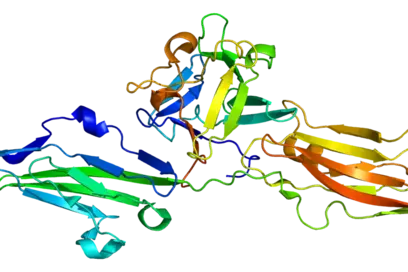Ein intaktes Immunsystem ist von größter Bedeutung für unsere Gesundheit. Rund um die Uhr ist es im Einsatz, um krankmachende Einflüsse zu bekämpfen. Doch obwohl unser Abwehrsystem auch Krebszellen als fremd erkennen kann, stößt der Körper Tumoren nur selten ab. Möglicherweise sind dafür so genannte regulatorische T-Zellen (Tregs) verantwortlich. Diese besonderen Abwehrzellen sind normalerweise dafür zuständig, unseren Körper vor einer Selbstzerstörung zu schützen, indem sie andere, zerstörerische Abwehrzellen dämpfen. Auch bei Krebs spielen solche Tregs eine Rolle. Sie könnten der Grund dafür sein, warum sich unser Abwehrsystem gegen Tumorzellen erstaunlich ruhig verhält.
Dr. Philipp Beckhove und sein Team im Deutschen Krebsforschungszentrum untersuchten in Kooperation mit der Arbeitsgruppe um Prof. Jürgen Weitz aus der Chirurgischen Universitätsklinik Heidelberg, welche Tumorantigene die regulatorischen T-Zellen aktivieren. „Bisher war es weitgehend unbekannt, welche Strukturen auf Tumorzellen von den Tregs erkannt werden“, sagt Beckhove, „das ist eine zentrale Frage der Tumorimmunologie.“ Dazu isolierten die Wissenschaftler T-Zellen aus dem Blut von Darmkrebspatienten sowie aus gesunden Kontrollpersonen. Die T-Zellen sortierten die Forscher in Killerzellen und regulierende Zellen und testeten deren Reaktion auf künstlich hergestellte Tumorantigene. Dabei entdeckten sie, dass die regulierenden T-Zellen nur einige der Tumorantigene erkannten, die T-Killerzellen dagegen von allen getesteten Tumorantigenen aktiviert wurden. Darüber hinaus fanden sie heraus, dass nur im Blut von Krebspatienten T-Killerzellen vorhanden waren, die sich gegen Tumorzellen richteten.
„Diese Erkenntnisse wollen wir nun nutzen, um eine bessere Immuntherapie gegen Krebs zu entwickeln“, erklärt Philipp Beckhove. Bei einer so genannten Krebsimpfung werden Eiweiße verabreicht, die auf der Oberfläche von Tumorzellen vorkommen. Diese soll das Abwehrsystem als fremd erkennen und damit alle Tumorzellen zerstören, die diese Antigene tragen. Doch bisher zeigte sich, dass die verabreichten Antigene sowohl die aggressiven T-Killerzellen als auch die regulierenden Tregs auf den Plan riefen, wodurch die Abstoßung des Tumors meist nicht richtig in Gang kam. In zukünftigen Studien wollen die Forscher nun insbesondere solche Impfantigene verwenden, die zwar die T-Killerzellen aktivieren, nicht aber die Tregs. „Wir versprechen uns davon eine erfolgreichere Therapie für die Krebspatienten“, sagt Beckhove.
Über das DKFZ
Das Deutsche Krebsforschungszentrum (DKFZ) ist mit mehr als 3.000 Mitarbeiterinnen und Mitarbeitern die größte biomedizinische Forschungseinrichtung in Deutschland. Wissenschaftlerinnen und Wissenschaftler erforschen im DKFZ, wie Krebs entsteht, erfassen Krebsrisikofaktoren und suchen nach neuen Strategien, die verhindern, dass Menschen an Krebs erkranken. Sie entwickeln neue Methoden, mit denen Tumoren präziser diagnostiziert und Krebspatienten erfolgreicher behandelt werden können. Beim Krebsinformationsdienst (KID) des DKFZ erhalten Betroffene, Interessierte und Fachkreise individuelle Antworten auf alle Fragen zum Thema Krebs.
Um vielversprechende Ansätze aus der Krebsforschung in die Klinik zu übertragen und so die Chancen von Patientinnen und Patienten zu verbessern, betreibt das DKFZ gemeinsam mit exzellenten Universitätskliniken und Forschungseinrichtungen in ganz Deutschland Translationszentren:
- Nationales Centrum für Tumorerkrankungen (NCT, 6 Standorte)
- Deutsches Konsortium für Translationale Krebsforschung (DKTK, 8 Standorte)
- Hopp-Kindertumorzentrum (KiTZ) Heidelberg
- Helmholtz-Institut für translationale Onkologie (HI-TRON) Mainz – ein Helmholtz-Institut des DKFZ
- DKFZ-Hector Krebsinstitut an der Universitätsmedizin Mannheim
- Nationales Krebspräventionszentrum (gemeinsam mit der Deutschen Krebshilfe)
Das DKFZ wird zu 90 Prozent vom Bundesministerium für Forschung, Technologie und Raumfahrt und zu 10 Prozent vom Land Baden-Württemberg finanziert und ist Mitglied in der Helmholtz-Gemeinschaft Deutscher Forschungszentren.



